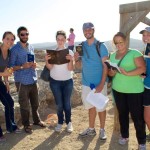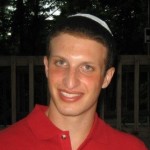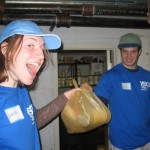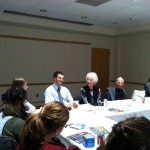Musings from Students of the Pardes Institute of Jewish Studies in Jerusalem
Posted on November 3, 2013 by Avi Benson-Goldberg
Josh Pernick plays doubles tennis at the Israel Tennis center, and needs a regular partner.
When I mention that this fact will be making it into the final piece, Josh points out that last night is the first time he’s managed to play doubles, and he played with David Levine. This profile, of course, will be more than an advertisement for Josh’s tennis needs. I regret to inform you that I haven’t played tennis with him yet, so I can’t remark on the strength of his serve.
 The reason why Josh Pernick came to Pardes isn’t the one you might think. It’s not because he grew up the son of a Reform rabbi. It’s not because he went to Brandeis. It’s not even because of the semester he spent in Ghana, studying abroad. Although he would admit that the semester he studied abroad in Ghana did bring about a monumental shift in how he thought about his Judaism. He’d left his job at Ramah Nyack early, and headed to Ghana, essentially going from the most immersive Jewish community he’d known to the least extant one. “I had one Jewish friend, and we did Jewish together. And what happened was, I’d arrived at nothing, and I had so much time to reflect.”
The reason why Josh Pernick came to Pardes isn’t the one you might think. It’s not because he grew up the son of a Reform rabbi. It’s not because he went to Brandeis. It’s not even because of the semester he spent in Ghana, studying abroad. Although he would admit that the semester he studied abroad in Ghana did bring about a monumental shift in how he thought about his Judaism. He’d left his job at Ramah Nyack early, and headed to Ghana, essentially going from the most immersive Jewish community he’d known to the least extant one. “I had one Jewish friend, and we did Jewish together. And what happened was, I’d arrived at nothing, and I had so much time to reflect.”
While he was there, Josh discovered for the first time how fascinating his Judaism was to the people around him, and while attempting to field their questions, he discovered how much there was that he’d taken for granted about his Jewish life in the States, and how much that he really didn’t know.
But he wasn’t thinking about Pardes. He was thinking about finishing college and going to HUC
 Josh is a pretty earnest guy when you meet him–he’s got a solid beard, and a comforting smile (lips, eyes, and teeth go into this one), and focused blue-green eyes that bore into you as he insists upon the truth of the matter. Whether that be the inaccuracy of the modern midrash movement, or how difficult and straining it can be growing up a Reform rabbi’s kid, he’s got killer focus. He’s 110% behind what he says, and probably 115% interested in what’s coming out of your mouth.
Josh is a pretty earnest guy when you meet him–he’s got a solid beard, and a comforting smile (lips, eyes, and teeth go into this one), and focused blue-green eyes that bore into you as he insists upon the truth of the matter. Whether that be the inaccuracy of the modern midrash movement, or how difficult and straining it can be growing up a Reform rabbi’s kid, he’s got killer focus. He’s 110% behind what he says, and probably 115% interested in what’s coming out of your mouth.
Naturally, he’s in the Pardes Center for Jewish Education.
“So tell me why you changed your mind about becoming a Rabbi?”
“Did I say I’d changed my mind about becoming a Rabbi?”
“Fair. Tell me why you haven’t yet made it to rabbinical school?”
 “Logistically, it had always been something that was far away, and once it became close, I had to decide if I wanted to spend the next five years of my life doing this. And senior year, I had a conversation with the director of Hillel at Brandeis and I didn’t really know him well before that conversation. He said ‘I think I see what you want to do in your life–and you should know you don’t have to go to rabbinical shcool to do it. There are other avenues.’ So I decided to get involved in non-profit work.”
“Logistically, it had always been something that was far away, and once it became close, I had to decide if I wanted to spend the next five years of my life doing this. And senior year, I had a conversation with the director of Hillel at Brandeis and I didn’t really know him well before that conversation. He said ‘I think I see what you want to do in your life–and you should know you don’t have to go to rabbinical shcool to do it. There are other avenues.’ So I decided to get involved in non-profit work.”
Josh graduated from Brandeis, packed up, and headed south to Charleston, SC to do a year with Americorps*VISTA, and intended to do his year there, and then move on to the world of Jewish non-profit work. But pretty quickly in the process, he started to have trouble.
It was serious and important work he was doing–fundraising drives, school supply drives, back-end administration–but it kept Josh in a cubicle inside the Department of Social Services building, from 8:30 to 5 every day. “And I didn’t really like this. I knew I wanted to do something around kids. I was looking for non-profits to work with kids. I’m thinking, maybe it makes sense to go into education.”
I need to stop you here. This is where Josh Pernick, and I, reveal that we’ve been burying the lede. ‘Josh,’ you’re asking, ‘how on earth can you go into education all of a sudden?’ It’s not like you can just get up and say, tomorrow I’m teaching.
And this still isn’t the part of the story where little Joshua Hillel Pernick, from Nanuet, NY, turns to Pardes. Josh already had his pre-school teaching certification, because he taught at the pre-school on campus at Brandeis.
It sounds amazing. It was amazing! For work-study, he worked in the pre-school: he’d come from working at Nyack as a counselor, and had been missing the feeling of working with little kids. So when the opportunity arose, he took it. “I’d been working in the dining hall, but I didn’t love. So I swapped to pre-school, and I ended up getting teacher certification from that.”
He got offered a job teaching pre-school at Addleston Academy, and he was waiting to hear back from a job with the Federation, working part-time at each. But as the clock ticked, and he wasn’t able to get a confirmation from the Federation, he was asked to teach all day: three-year-olds in the morning, and four-year-olds in the afternoons.
“The huge difference was I woke up excited to go to work: the year before I woke up dreading going to work. Think about it, a cubicle? Or big hugs? It was all luck.”
Quickly Josh realized that this was the better career path.
 Early on in that year, very early on, he decided ‘this is the career,’ and looked into how to make it a reality. Because of his Brandeis bias (his mother went to Brandeis, his older brother, and Josh himself), DeLeT was the program he turned to. He applied in October, and no one else applied until March. “I was the first person in the cohort for months! Not that you knew.”
Early on in that year, very early on, he decided ‘this is the career,’ and looked into how to make it a reality. Because of his Brandeis bias (his mother went to Brandeis, his older brother, and Josh himself), DeLeT was the program he turned to. He applied in October, and no one else applied until March. “I was the first person in the cohort for months! Not that you knew.”
At DeLeT, Josh spent an intense and intensive year in the classroom, building his personal teaching practice. He taught secular studies and Judaics, which he really enjoyed. But he ran into a wall. Just as years before in Ghana, he’d started to notice the limits of his knowledge, here too, in a classroom full of third-graders, he began to become uncomfortably aware that he didn’t have the confidence or knowledge to answer their questions, design programming, or guide conversations.
But he really wanted to teach Judaics. He’d been asked if he could teach a middle-school Judaics elective, and he felt that he didn’t know what to do for that for a year. DeLeT is connected. Pardes is connected. In fact, they’re both connected one to the other. So Josh had been pressed by mentors to go to Pardes–“if you want to teach Judaics, one mentor teacher told me, you need to spend at least a year learning in yeshiva, studying text.”
“The thing about Josh,” says PEP student Tani Cohen-Fraade, “is he’s already taught. So he’s always mentioning in class how he taught this subject last year. He’s already got the experience.”
He leans back. Smiles a little–QED. Here we go, here’s how Josh got here. We go out for sushi. Case closed.